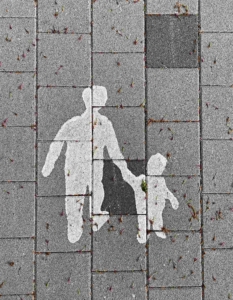Codependency is not just related to substance abuse relationships, it now includes the emotional connections of dependence on anyone in a relationship. Parental codependency is when a parent feels that they have an intense feeling of being responsible for their child and an excessive need for approval. This creates an unhealthy relationship with the child.
The codependent parent tends to exercise an overabundance of control. This makes the already complex relationship between parent and child more complex. These relationships become harmful and can lead to unintentional abuse. These relationships have little to no boundaries.
What are the causes of parental codependency?
 Most of the causes of this type of dependency stem from the parent’s childhood experiences. Our childhood interactions impact how we believe we should be treated. These beliefs are carried with us into adulthood. They then affect our parenting style.
Most of the causes of this type of dependency stem from the parent’s childhood experiences. Our childhood interactions impact how we believe we should be treated. These beliefs are carried with us into adulthood. They then affect our parenting style.
Some of the major behaviors of codependency are influenced by:
Permissive parenting.
This typically results in allowing the child to grow with little to no guidelines or rules. The child may fail to understand what self-discipline is or how to acknowledge boundaries set by others. These parents show their children love and affection but fail to set healthy boundaries for the child.
Emotional and physical abuse.
When a child experiences abuse they are more likely to fail at developing healthy boundaries and behaviors. They may grow to be codependent parents to keep their children from experiencing the abuse they did as a child.
Overprotective parenting.
When a parent is constantly trying to protect their child, “helicopter parenting,” can prevent the child from learning the skills needed to face challenges as they grow. This can cause a person to become unable to live independently resulting in parental codependency.
Childhood neglect.
This is not the same as abuse although can be linked to abuse. When a child doesn’t receive the basic needs in the formative years they may decide their needs are invalid. This can lead to a lack of parenting skills as the child enters into adulthood.
Substance abuse.
When a parent struggles with substance abuse it can lead the child to grow up with codependent behaviors. Most of the time these children are thrown into the role of caregiver in a chaotic family environment.
 Are all codependent parents narcissistic?
Are all codependent parents narcissistic?
Though some traits can be found between narcissistic and codependent parents, most of the time they are not the same. Narcissism is fueled by thoughts of only needing oneself while codependency is fueled by thoughts of needing another person. There are times that the two can be exhibited by the same person. In this parent-child relationship, the dynamic is explosive and somewhat easier to identify.
Common signs of parental codependency.
Identifying the signs of parental codependency isn’t as easy as it sounds. Codependent parenting can show the signs of a healthy relationship with their child. Most of the time the relationship gets to the point of being strained. At this time the following signs of parental codependency may begin to surface.
Controlling.
Parents who tend to be over-involved in the life of their child may exhibit behaviors such as. offering advice without being asked, being resentful if the child doesn’t follow their advice, and not believing the child can age-appropriately take care of themself.
Difficulty with boundaries.
This happens when a parent excessively desires to keep their child safe regardless of age or behavior. Most noted when they try to keep them out of trouble.
Lack of sense of self.
They believe their worth comes from how they care for their children.
Passive aggressive behavior.
Manipulation through making the child feel like the parent does so much that they need to follow the advice of the parent.
Low self-esteem.
When a parent struggles with this they show signs such as trouble making decisions, inability to ask for their needs, seeking approval from others, and feeling unworthy/unlovable.
Catastrophizing.
Codependent parents fear rejection/criticism and tend to make it seem as though any issue is the end of the world.
 Role reversal.
Role reversal.
This is evident when the child has to assume the parental role and take care of the parent and possibly siblings.
Martyrdom.
The parent tends to get caught up in how much they willingly sacrifice for the child.
Highly protective.
Because they find worth in the behavior of the child they will take on the criticism as reflection.
Extreme reactions.
When they feel their control is being threatened they exhibit intense reactions such as anger and fear.
How parental codependency affects the child.
Children being raised in this type of parenting often struggle with many issues that can follow them into adulthood. They may develop low self-esteem because they feel as though their emotional or mental needs are unimportant. This can create a guilty feeling when they express that they need anything from the parent. Low self-esteem will have an impact on how the child perceives their self-worth. As they reach adulthood this can hinder how they interact with others.
Children raised with parental codependency have seemingly matured quicker than they should have. They assumed responsibilities at an early age which led them to behave as a mini-adult even though they were still a child. This role reversal begins to take on the characteristics of being an enabler without the child being aware of this behavior.
Getting help for a codependent parent.
When a child realizes that their parents are codependent it is usually when they are adults. They may see behaviors in themselves that they are questioning. This can lead them to the realization that they need to understand how to help their parent as well as refrain from becoming codependent themselves.
Here are some ways you can help yourself and your parent break free from parental codependency:
- Become aware of the problem so that changes can be made.
- Set up boundaries and understand that this is for them as well as you.
- Learn how to practice self-care.
- Do not continue to enable.
- Do not assume guilt.
- Get professional help.
Parental codependency does not reflect the love they have.
A codependent parent doesn’t love their child any less than a parent in a healthy relationship with their child. They have a desire to protect their child and help them achieve their dreams like any other parent. But because of childhood experiences, they tend to connect that love to behaviors and patterns. There is a deep interconnection between their love and their focus on their child.
Healing after codependent parenting.
 There is always hope that a parent-child relationship can be healed and restored. For this to occur, there has to be a willingness from both sides to understand boundaries and how to navigate without control. Getting help from a local Christian counselor can help make this transition easier. The most important part of this journey is communication. The ability to be open and honest will help ensure that there is true healing.
There is always hope that a parent-child relationship can be healed and restored. For this to occur, there has to be a willingness from both sides to understand boundaries and how to navigate without control. Getting help from a local Christian counselor can help make this transition easier. The most important part of this journey is communication. The ability to be open and honest will help ensure that there is true healing.
An adult who has grown up in this type of relationship with their parent will find that there is an impact on the way they relate to others. They may have trouble with romantic relationships as well as self-confidence. Through counseling these issues can be resolved and the adult can develop a healthy lifestyle without being codependent.
Conclusion.
Understanding parental codependency and being able to identify the characteristics are the first steps in being able to get help for the parents. Most of the time they aren’t aware that this is a concern. They may even deny that they are codependent because they feel it is a healthy form of parenting.
Those who do identify with this struggle can make changes by getting help from a Christian counselor in their area. If you are a child of someone who suffers from parental codependency you can also get the help you need through a faith-based treatment plan with a Christian counselor.
Trust in the Lord with all your heart, and do not lean on your own understanding. – Proverbs 3:5, ESV
“Sidewalk Graffiti”, Courtesy of Suzi Kim, Unsplash.com, CC0 License; “Shoulder Ride”, Courtesy of Kelli McClintock, Unsplash.com, CC0 License; “Man by Window”, Courtesy of taylor, Unsplash.com, CC0 License; “Light Through A Tree”, Courtesy of Jeremy Bishop, Unsplash.com, CC0 License









